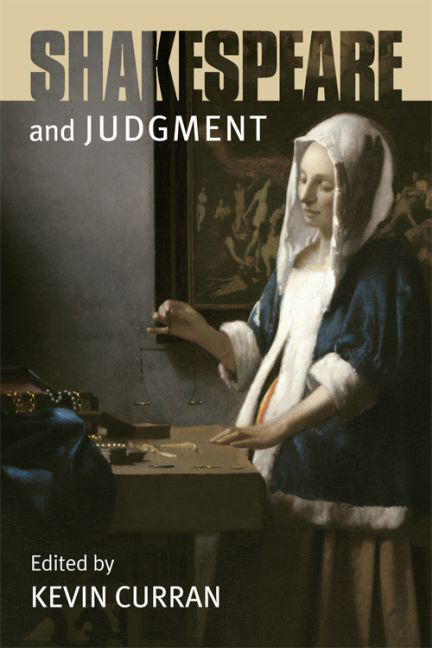Introduction
Published online by Cambridge University Press: 10 May 2017
Summary
Shakespeare and Judgment. It's a simple enough proposition. “Shakespeare” and “judgment”: two keywords, both fairly recognizable, each offering a context for the other. And yet the title of this book immediately raises some questions. First of all, what exactly is “judgment”? Is it an act or a process? A concept or an experience? To which cultural or theoretical field does it belong, and to what set of social practices? Also – and perhaps most importantly – what does it have to do with Shakespeare? Given how many items have appeared on the other side of the “Shakespeare and” formulation – from religion, law, appropriation, the book trade, and national culture to masculinity, republicanism, Ovid, music, and language – what justifies adding yet another? What, that is, does judgment offer Shakespeare studies as a category of critical inquiry? This introduction will begin to provide some answers to these questions, setting the scene for the more specific projects that follow. Grounding the volume are two core contentions: (1) that attending to Shakespeare's treatment of judgment leads to fresh insights about the imaginative relationship between theater, law, religion, and aesthetics in early modern England; and (2) that judgment offers new ways of putting the historical and philosophical contexts of Shakespeare's plays into conversation.
This is a new undertaking, the first attempt to articulate the central place of Shakespearean drama in the cultural and intellectual history of judgment. That said, the volume builds on a number of earlier studies. Richard Strier, for instance, discusses what he views as Shakespeare's skepticism about moral judgment in chapter three of The Unrepentant Renaissance: From Petrarch to Shakespeare to Milton, and returns to the idea in an essay called “Shakespeare and Legal Systems: The Better the Worse (but Not Vice Versa).” Julia Reinhard Lupton explores the idea of judgment at a number of points in Thinking with Shakespeare: Essays on Politics and Life, especially in a chapter devoted to The Winter's Tale which draws compelling parallels between Shakespeare's and Hannah Arendt's conceptions of judgment. Lupton extends this line of thought in a more recent essay dealing with the relationship between judgment and forgiveness in The Winter's Tale.
- Type
- Chapter
- Information
- Shakespeare and Judgment , pp. 1 - 18Publisher: Edinburgh University PressPrint publication year: 2017



